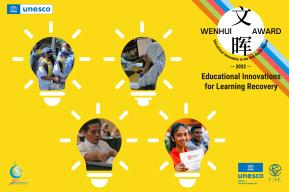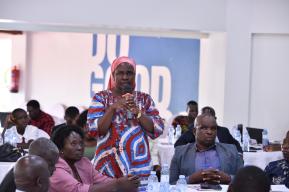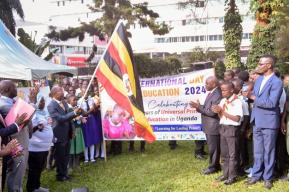News
Teachers in Uganda adapt to new realities post-COVID-19

“We are trying to embrace the opportunities and little by little we shall get there.” These are the words of primary level teacher trainer Fiona Kiyemba who has had to adapt to teaching remotely in Uganda during the COVID-19 related closures of Teacher Training Institutions (TTIs).
When COVID-19 hit, to support teachers adapt to the changing realities of the classroom, UNESCO’s CapED Programme rapidly launched new interventions to tackle the crisis, with a continued focus on supporting teacher quality.
In order to inform Government and development partners’ actions, UNESCO initiated a teacher assessment, in cooperation with TTIs and IICBA, to determine teachers’ capacity gaps in ICT skills. This meant that going forward, interventions could be more targeted and efficient. One of the assessment’s recommendations which UNESCO is tackling is that there is a need for teachers and teacher educators to be trained to prepare and deliver interactive, digital content to be uploaded on online platforms. Other recommendations are also being acted upon for example to address the need to modernize assessment methods, the Government is developing a Digital Agenda Strategy, which will provide online continuous assessment.
According to the assessment’s findings, there was a need to empower teachers to use ICTs, adapt to the changing realities in the classroom, and to deliver distance learning. Therefore, CapED helped develop a training manual, aiming to equip in-service teachers and teacher trainers with skills on delivering online lessons, digitizing learning and teaching materials, and using a range of online platforms and tools. UNESCO then supported the training of 379 in-service teacher trainers in 2020 and continues to roll out the training in 2021, across the entire country. During the training sessions, teacher trainers like Fiona learned how to assess learners, give them feedback, and to carry out peer assessments through ICT tools, all skills that will continue to be relevant once schools reopen.
Mirembe Lukiya, who also attended the training, acts as focal point for the ICT Integration in her TTI and teaches English to teachers-in-training. She explained that when institutions closed their gates, most teachers and learners did not possess the skills to continue teaching and learning online. The training taught her how to upload resources and enrol learners for maximum participation. Going forward, Mirembe pledges to share what she has learned during the workshop by holding a training at her TTI for other teacher trainers. Her main message to learners is that: “we cannot stop teaching as a result of COVID-19. Learning should be continuous.”
These activities continue to be crucial to help teachers adapt since on 6 June 2021, Uganda once again closed its school gates due to another wave of COVID-19. Looking ahead there are plans in place to continue to roll out the trainings for teacher trainers and it is expected that these trainers will pass on their knowledge within their respective TTIs, targeting both students and tutors. In parallel to these activities, the Ugandan National Institute for Teacher Education (UNITE), that was recently established by the Government, will be responsible for the continuous professional development of teachers and make online educational courses available. Building on this momentum to strengthen teachers to adapt and modernize their skills, the Government and development partners are prioritizing teacher capacity development as one of the key pillars to support the Digital Agenda Strategy.
Continuous professional development of teachers has been one of the focus areas of the CapED programme in Uganda, upon which the CapED COVID-19 response builds. Since 2014, UNESCO has supported the Government and education stakeholder in Uganda, with technical assistance from IICBA through CapED in developing a National Teacher Policy and related frameworks needed for its implementation, including, the Continuous Professional Development and Social Dialogue Frameworks.
- More on UNESCO’s CapED Programme




